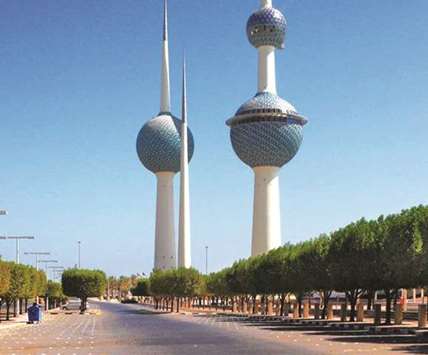Kuwait’s non-hydrocarbon growth is expected to accelerate to an average of 4.1% over 2017-2019 as the authorities implement an investment programme that aims to upgrade refineries and infrastructure, a report by QNB Group said.
The report, Kuwait Economic Insight 2017, examines recent developments and the outlook for the Kuwaiti economy.
“Opec production cuts, which we assume will last until the end of 2018, will depress non-hydrocarbon growth in 2017-2018.
However, oil output will likely be quickly ramped up in 2019 to pre-cut levels, providing a boost to growth,” it added.
Oil prices are forecast to recover as the market shifts from excess supply to excess demand in 2017, but prices will be capped by US shale costs, averaging $55/b in 2017, $58/b in 2018 and $60/b in 2019.
The report said inflation is projected to decline modestly to 2.9% in 2017 on falling rents, but then spike in 2018 with the expected introduction of value added tax (VAT). Thereafter, prices should ease in 2019 as the base year effect of the VAT dissipates and the rest of the basket is expected to be broadly stable.
The government’s budget balance is expected to return back to a surplus of 2.2% of GDP in 2017 due to a recovery in hydrocarbon revenue but then average 1.2% in 2018-19 as the government continues its investment spending programme.
The government is in the midst of an investment drive aimed at increasing refining capacity as well, developing infrastructure. Some signature projects include an expansion of the airport and the development of a national railway.
Revenue should receive an additional boost from VAT implementation in 2018, the report said.
The current account is expected to return to an average surplus of 2.8% of GDP in 2017-18 on rising oil prices and then rise to 4.7% on a pick-up in oil production in 2019.
The capital and financial account (CFA) should witness a surplus of 4.7% of GDP in 2017 due to a $8bn international sovereign bond issuance.
Beyond 2017, the CFA should return to a deficit as current account surpluses are invested abroad, the report by the QNB Group said.

Kuwait’s budget balance is expected to return back to a surplus of 2.2% of GDP in 2017 due to a recovery in hydrocarbon revenue but then average 1.2% in 2018-19 as the government continues its investment spending programme, the QNB Group’s report says.
